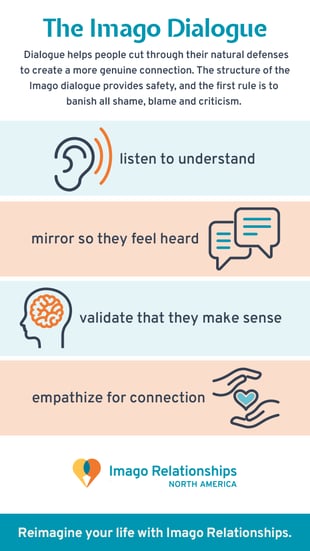
In North America, we have a deeply embedded belief that if we marry the right person, things will be easy, we will get our needs met, and we will "live happily ever after."
Therefore, we aren't prepared for the inevitable conflict that relationship brings.
When conflict shows up, we will argue, we hope it will go away or resolve itself on its own.
If it continues, we may tell ourselves we cannot make the relationship work because we are with the "wrong person." Or, we no longer have anything in common with our partner, and there has got to be something or someone better out there.
Divorce rates are high as a result. We see relationships as disposable.
But what if we want our marriage to work? Imago Relationship Therapy (IRT) helps couples work more effectively with difficult impasse issues, sometimes quite easily.
The Imago Philosophy
One thing IRT helps couples understand is that conflict is unavoidable, and that conflict is actually "growth trying to happen," so that we start to realize there is value in choosing a partner who pushes our buttons or asks us to change!
With IRT, couples start to understand that "under every frustration is an unmet need" and that power struggle provides "opportunities for growth and healing." So we want to get underneath the frustration to share the need.
Yet this shift is not easy when frustration is repetitive and unresolved. What I notice when I sit with couples is that when a perpetual or repetitive issue comes up, the level of brain reactivity is very high (i.e., they get quite upset). When this occurs, I can see that while both people mean well, one or both may not be able to see truly how their partner means well. They are way too upset to see past their upset.
An Imago Technique
So here is a small but powerful writing exercise to do on your own, where each partner takes time to sit and write. Then share your written insights.
-
Get in touch with your stance, your stubborn, and dug-in place. For example: when you are late and don't call.
-
Get in touch with your feelings, allow yourself to feel that in your body. For example, I feel angry, and I feel that anger in my face and throat. I also feel sad and feel that in my chest.
-
Next, get in touch with your thoughts around this moment. In IRT, we say, "The story I tell myself about this is.…" or "The story I tell myself about you is…." For example, the story I tell myself is that you are inconsiderate and don't care about me.
-
Next, explore your want, wish, desire, or need that is underneath your stance. This may take time, so sit with this as long as you need it. For example, I need to feel important and respected, and like I matter enough for you to let me know when your plans change.
-
What are you protecting? For example, my anger protects me from feeling like I don't matter.
-
What does this remind you of your childhood (or previous relationship)? How does this feel the same or different? For example: growing up, my parents cared about my sibling and not about me.
-
Write it all out. Then sit back, re-read your answers as if you are "simply a witness to the process." If possible, allow yourself to "let go" of any upset or attachment to this writing; this "story," and come back to your centered, calm place. Remember, this is a growth opportunity and only one side of a conflict.
Take some time to write about each step and invite your partner to do the same. Then at a time when you both feel calm, sit, and listen to the stories and realizations of each other.
Use the Imago Dialogue Structure to mirror, summarize, validate, and give empathy, if you have learned that and have become Dialogical in sessions with your Imago Therapist.
The Hardest Part
If you find yourselves wanting to argue against what you hear, remind yourself to stay open, safe, and curious. A reward of new information and greater understanding is waiting if you listen deeply and wait to talk.
If you are not practiced in Imago Dialogue, try to imagine you are "a rock with ears" and tell yourself that this process works well if you do not interrupt each other. You may also have to remind your partner to stay curious and simply listen.
You may say something like this, "I know this is difficult. I really appreciate your willingness to do this process. Please hang in with me. Can you please listen?"
If not, then it would be wise to take a break until you are both calm and available. Remember, this is a touchy subject!

This exploration process, where you find what is underneath a repetitive frustration, can vastly increase your understanding of what set up the perpetual issue and potentially how you both fit together in perfect opposing ways.
Understanding and accepting this can help move both of you towards a sense of greater peace and compromise when the issue comes up the next time. Because you now both understand that it will come up again!
Be sure to seek support from a qualified Imago Relationship Therapist if you and your partner are not able to share while staying calm and curious. Check out our Imago Relationships Therapy.
Discover more about Imago with our Imago Professional Membership, Imago Professional Facilitators, Imago Professional Training and Imago Educational Webinars.
 This blog post was written by Stacy Bremner, MA, RP, Registered Psychotherapist.
This blog post was written by Stacy Bremner, MA, RP, Registered Psychotherapist.
Stacy Bremner is in private practice in North Bay, Ontario, Canada. She holds a Specialized Honours B.A. in Psychology and an M.A. in Human Development. She is a Registered Psychotherapist (RP) with the CRPO (the College of Registered Psychotherapists of Ontario), as well as a member in good standing with the OAMHP. Stacy is also a Certified Imago Relationship Therapist with Advanced Clinician status and a Certified Imago Workshop Presenter.
For two decades, she has assisted individuals, couples, and groups. She has taught a variety of workshops on topics such as relationships, communication, sexuality, healing, self-awareness, creativity, and self-help. Stacy has a background in Cognitive Behaviour Therapy (CBT), Meditation and Mindfulness, Psychodramatic Bodywork, Conscious Core Transformation (CCT), The DNMS, Discernment Counselling, and PACT. She also continues to study and teach in the area of Couplehood and sexuality.
Even before she became a Psychotherapist, Stacy was a spiritual seeker and passionate about her own healing journey. Areas of study for Stacy include Kabbalah, Buddhism, and ACIM (A Course in Miracles). Because she is so passionate about her work, she cannot resist the desire to upgrade her skills in an ongoing way through reading, attending workshops, and teaching. Stacy feels that all these efforts contribute to her growth as a well-rounded person, a therapist, and a spiritual being.
Check out Stacy's website: www.ameetingofminds.ca


